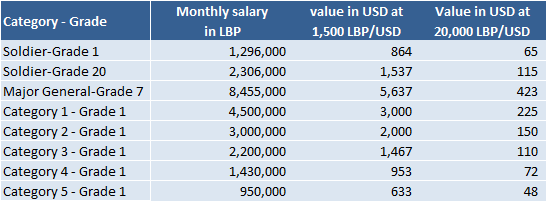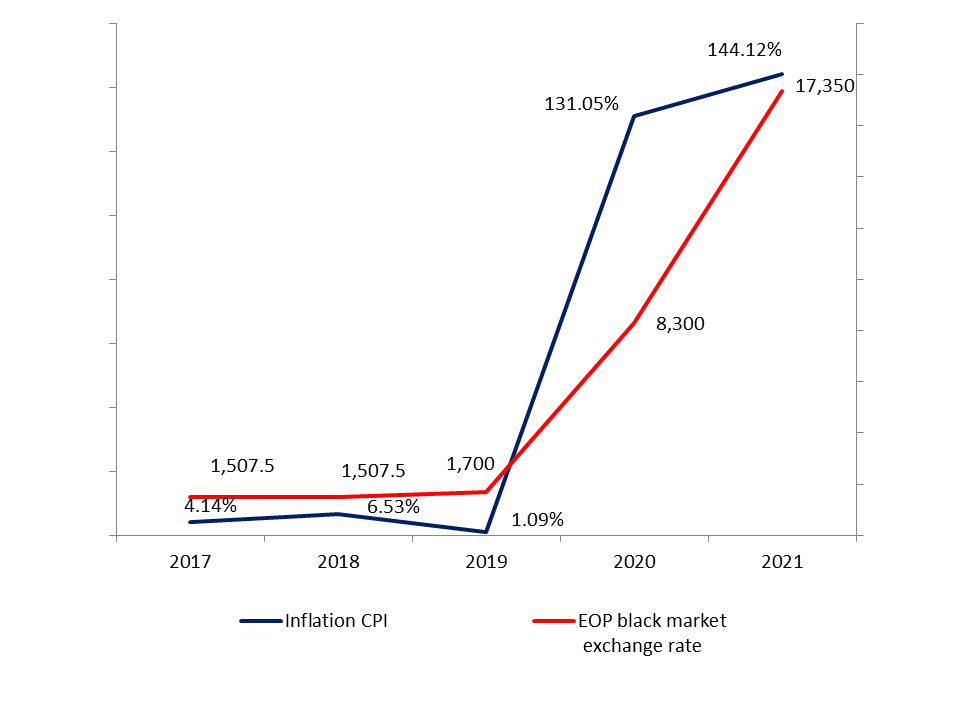Following the devaluation of the Lebanese pound and the removal of subsidies for essential products, purchasing power of the Lebanese has been considerably demolished, and consequently real wages have decreased noticeably to be among the lowest worldwide.
To elaborate, the minimum wage (LBP 675,000) per month today is equal to $33.75 at the exchange rate of LBP/USD 20,000, at a time when the level of extreme poverty is measured by $5.5 per day per person!. In the public sector, which employs close to 300,000 people if not more[1], salaries of the 4th and 5th category employees have also eroded to become $71.5 and $ 47.5 instead of $953 (1,430,000) and $633 (950,000 LBP) at the official exchange rate, respectively. Concerning the highest public wages, salaries for 1st, 2nd, and 3rd categories have also fallen to dramatic numbers from $1,467, $2,000, and $3,000 on the official exchange rate to $110, $150, and $220 on the exchange rate of LBP/USD 20,000. The salaries and indemnities of the military services suffered the most from the current economic crisis. Major General’s salary is worth today $360.60 whereas the lowest salaries refer to the soldier Grade 1 with a worth of $64.80 only.
Salary decline for the public sector employees:

Source: Information International based on Law No 46
Moreover, complete removal of fuel subsidies poses additional negative impact on the Lebanese especially public sector employees. For instance, previously the cost of transportation grasped 5% to 7% from the minimum wage (LBP 675,000). Today, this cost accounts for more than 60% of a soldier’s salary. In this context, employees will be faced with two choices, raising salaries or leaving their job and disrupt the economic cycle.
However, wage correction for the public sector is not in tune with the current situation of public finances. Although it is vital to proceed with this process, any serious act is simply impossible before any rationalization of the public sector. But in the meantime special adjustments could be undertaken, and fast, to help improve its employees’ purchasing power, if only marginally.[2]
Concerning the increase of the minimum wage, which will affect the 900,000 or so people who work in the private sector; it should be adjusted in accordance with the inflationary pressures and cost of living, but again subject to private sector’s capacity to pay such an increase. Keep in mind that, employees in the private sector have seen some adjustments to their wages, including adjustments involving payments in USD.
The above dire situation calls for immediate, feasible adjustments in wages, especially those of the public sector. But what is equally important to do in the short -to medium- term is to embark on serious reforms that stabilize the exchange rate, improve public finances, and bring back jobs, which all will allow for meaningful corrections in people’s wages and stop the deterioration in, if not improve, their purchasing power. And, yes, the time has surely come!
Inflation and End of period black market exchange rate by September:

Source: Central Administration of Statistics, BLOMINVEST
[1] Total employed in Lebanon is about 1.6 million, 79% of them are Lebanese.
[2] It is ironic a crisis that according to many observers has started with public wage increases, it is now public wages that are paying the brunt of the implications of this crisis.